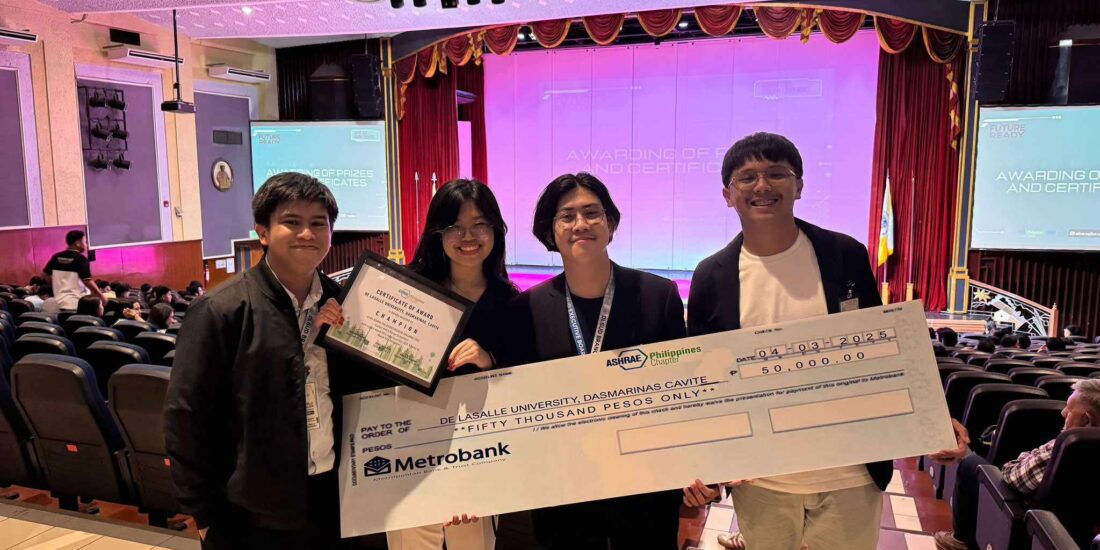DLSU-D’s College of Law outlines vision and goals for the program
Originally published in Heraldo Filipino Volume 38, Double Issue
Following the establishment of De La Salle University-Dasmariñas’ (DLSU-D) College of Law (COL), Dean Atty. Jude Marvel shared insights into the program’s development, resources, and commitment to delivering quality legal education.
Building the foundation
In an interview with The HERALDO FILIPINO, Marvel shared that the process of creating the program started two years ago, with the approval from the Legal Education Board (LEB). “We wanted to make sure that we are not just compliant, but above the compliance requirements. So, necessarily, the program was opened because we met all the regulations of the legal education board,” she emphasized, mentioning that the reason why its establishment wasn’t publicized was because they did not want to preempt its approval.
She also clarified the difference between a Juris Doctor (JD) program and a Bachelors program, noting that all other courses in the University are all under the Commission on Higher Education (CHEd), while the COL is under the LEB.
“It’s totally different, because a JD, or a Juris Doctor, under the regulation of the legal education board… when you speak of programs, this is the program. The Juris Doctor is the program,” she added.
Specialization tracks
With regards to specialization tracks, she noted that specializations happen after the student graduates from their law school, takes the bar, passes the bar, then becomes a lawyer.
“Specializations [is] one of the innovations that we’ve established for the College of Law and even for the Legal Education Board. So, for example, you want to go to law school and you decide that from the start pa lang you know what you want to specialize in, so you will take electives that will be your track. So for example, you take all electives about corporate law… so all these tracks, you will be able to take up through your electives,” she explained.
Available resources for aspiring lawyers
In terms of resources available for COL students, Marvel mentioned two things: the law library and the faculty. “We have the law library. It’s fully operational, it meets the requirements with the education board… computers, and internet… our online cases are available… our reports. Basically, all the materials that a law student would need, they can find it in the library for purposes of learning about the law,” she noted.
According to her, the law journals are varied from many jurisdictions, sourced from the US, along with updated textbooks, ensuring that they are not obsolete and that they evaluate these materials every year.
She also mentioned that the law library has its own section in Aklatang Emilio Aguinaldo – Information Resource Center (AEA-IRC), mentioning that its portion and size are specifically mandated by the LEB, while all the facilities used by COL have been approved by the LEB as well.
Marvel furthered, “The best resource are our faculty, so we make sure that we invited and hired the best. Our faculty are one of the most committed, not only just because of their credentials ‘no, but because of their passion talaga. They are excited along with us. they want to help us grow as an institution, so they’re really good to dedicate their time and their attention to make sure that the law students really get the quality of education that they deserve… that they applied for.”
She also admitted the reality that the program is just starting out, hinting on the possibility of having its own separate library as the program grows bigger over the years.
Expected number of enrollees
When asked about the expected number of enrollees, Marvel shared that they were eyeing for one section composed of 30 to 35 students, revealing that the college currently has 30 enrolled students for the AY and that they had to let go of some who were not a fit for the program.
“And considering also that… there wasn’t a lot of advertisements for it, and yet, the people came, ‘di ba? So, can you imagine what the program will look like next year, the applicants next year, if we are now able to now advertise the faculty, etc.,” she added.
On ensuring the quality of its legal education
When asked about ensuring the quality of its legal education, Marvel said that they will always ensure that they comply with the requirements of the LEB as the minimum standard.
“Because otherwise, if we don’t meet the standards of the Legal Education Board (LEB), first of all we won’t be able to be credited, we won’t be given the permit, and second, we might face closure. So, that’s the primary goal: We’ll always make sure that we meet the standards of the Legal Education Board, and the LEB is very hands-on—they make sure all the law schools in the country are compliant with the requirements,” she added.
She also shared three things that they want to make sure of: First is to get the students who are really sincere and passionate about the law and will ensure that they will finish their degree and go on to pass the bar and become lawyers.
Second is the faculty, wherein she stated, “We want to make sure that our faculty are passionate also about teaching future lawyers na they want to make sure na they’re here not just to teach the law, but to teach the law in a grand manner… so there. And third, our team here. We make sure that all of these tie up, and [that] we are able to meet our goals,”
Looking ahead, Marvel reiterated the College’s goal to produce not just competent lawyers but also legal professionals that are grounded on the core Lasallian values. “Hopefully, we will make sure that we just don’t produce lawyers, but produce lawyers who are Lasallian lawyers… grounded Lasallians,” she concluded.




